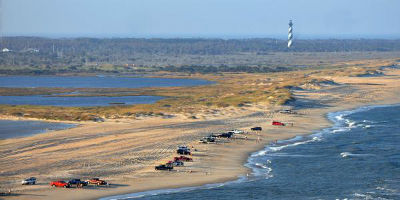RALEIGH – Medicaid cuts and pay raises for teachers generated most of the headlines last week, but a fast-moving budget proposal by the N.C. Senate contains, like all budget bills, numerous provisions that change environmental laws or policy.
Among the key environmental provisions, sections of the bill contain money for inlet dredging, monitoring the now-infamous coal ash ponds and for what would be the most peculiar park in the state.
Supporter Spotlight
Under the Senate budget, the N.C. Department of Environment and Natural Resources, or DENR, would get $8 million to cover the cost of monitoring coal-ash ponds. Almost double that amount would be set aside to buy land at Oregon Inlet in Dare County for a new state park that could feature jetties to stabilize the notoriously unstable Oregon Inlet.
The Senate passed its $21.1 billion budget plan early Saturday morning after heated debate over cuts to state Medicaid programs and how to pay for teacher and state employees’ raises. The budget now moves to the N.C. House.
A State Park for Jetties?

The National Park Service would have to sell some of Cape Hatteras National Seashore to the state for a park for jetties at Oregon Inlet. Photo: National Park Service |
In all, roughly $15 million is set aside in the Senate budget to acquire Oregon Inlet and nearby land that’s now part of Cape Hatteras National Seashore and Pea Island National Wildlife Refuge. The inlet, which separates Bodie and Hatteras islands on the Outer Banks, has always been difficult to keep open for safe navigation, but it has becoming increasingly more dangerous in recent years. Its channel was all but unnavigable much of this year. If it owned the land on either side of the inlet, the state could then presumably take steps to stabilize the inlet, including the construction of long-sought jetties.
The budget bill established a new fund under DENR that would cover land purchases – assuming the federal government wants to sell chunks of its park and refuge. The fund would also pay for dredging the inlet and for private lawyers to handle the litigation that would likely arise from all of this.
Supporter Spotlight
A little less than half of the $15 million would come from an existing fund that the N.C. Department of Commerce uses for industrial development and from reserve money set aside by the state Office of Management and Budget for land purchases.
Money unspent or unencumbered by June 30, 2015, would revert to the state’s General Fund.
The budget also authorizes the state to swap land with the federal government as part of any agreement. State-owned land adjacent to or within 100 miles of federal land may be exchanged for the new park.
All of this grew out of the Oregon Inlet Land Acquisition Task Force, an inter-agency study group mandated by the legislature last year. The task force issued a report May 1, calling for a purchase or land swap of the inlet and nearby land.

Sen. Harry Brown |
Gov. Pat McCrory included $500,000 in his budget to implement the task force’s recommendations and Sen. Bill Cook, R-Beaufort, introduced a bill last month proposing $15 million in funding for a new state park at the inlet.
Sen. Harry Brown, R-Onlsow, the Senate majority leader and one of the chamber’s chief budget writers, said the funding is a commitment to move ahead should negotiations with federal officials prove successful.
“I think we are committed to doing what we can to address the Oregon Inlet issue,” Brown said. He said he thinks there is support in the legislature to set aside funding in the event of a deal, but that much of what happens depends on the federal pieces falling into place.
“As we continue to negotiate with them, I think that will dictate what we can do as a state,” he said. “We’re continuing to talk with them. We’re putting money in place to take care of Oregon Inlet.”
Another provision in the budget bill, mirrors language in a new Senate regulatory overhaul bill that grants the governor authority to bypass environmental permitting to repair and replace bridges and roads on the coast in the event of a declared emergency.
The bill also charges the state Department of Transportation to identify an Outer Banks Transportation Corridor by Nov. 30 and requires the N.C. Department of Administration to begin condemnation proceedings “on all federally owned properties that are necessary to manage existing and future transportation corridors on the Outer Banks.”
Dredging Shallow Inlets
Brown also said he thinks the budget represents a new phase in funding to dredge the state’s shallow inlets. Brown tussled with inland legislators last year over an increase in boating registration fees that went to funds to dredge those inlets.
The Senate budget redirects $500,000 of that money to the state Wildlife Commission to reduce hydrilla, a noxious weed, at Lake Waccamaw and other inland lakes, a compromise Brown said he worked out to keep the fund intact.
“A lot of folks who use boats on lakes had some concerns,” he said. “I think this is a compromise to address the weed issue for them and for those lakes.”
In all, the budget includes roughly $7 million in funds for inlet dredging, which Brown said will amount to $12 million when federal matches are added.
“I think we’re covered and I’m committed to monitor that piece closely,” he said.
DENR and Coal Ash

A state lab in Nags Head that tests for fecal coliform bacteria in shellfish waters would be closed under the state Senate budget plan. Photo: Utah State University |
After years of declining funding, the state’s main environmental regulator will see an increase of more than $8 million, the bulk of which will pay for close to two dozen new employees dedicated to regulating coal-ash ponds and to whatever mediation plans the legislature settles on this session.
Under the plan, the bulk of the new positions will go to DENR’s Division of Water Resources to inspect the ponds, monitor groundwater and develop plans to correct or close the 14 major coal-ash sites, all current or former coal-fired power plants now owned by Duke Energy. These include Sutton Power Plant near Wilmington, which is one of four sites named as a priority for cleanup.
Other new positions under the coal-ash plan would include two new positions to address stormwater permitting, inspection and compliance; two new positions in the N.C. Division of Waste Management to handle permitting of industrial landfills for the ash; five new positions dedicated to dam inspection and safety evaluations at the ash ponds; and up to six new “reserve” positions in the secretary’s office to support management of the coal ash plan. In all, the Senate proposal anticipates annual cost for the coal-ash program at $1.75 million.
To pay for the increase, DENR’s budget is cut elsewhere by eliminating about 14 positions. About half are currently vacant.
Other DENR cuts include:
- Closure of the Museum of Forestry in Whiteville for a savings of $391,117
- Closure of the N.C. Division of Marine Fisheries office in Nags Head and elimination of three positions in the division’s section that monitors water quality for shellfish consumption and swimming for a savings of $148,240
- Reduction of $1.4 million from the Drinking Water Revolving Fund
The Bullet List
Other coastal items in the Senate proposal budget would:
- Provide $3 million for hull repairs to the USS North Carolina
- Provide $150,000 in start-up money for habitat mapping and data collection for a new state oyster sanctuary in Pamlico Sound
- Direct a study of state shellfish leasing and franchise programs, including study of best practices and the effect of regulations on the private mariculture industry
- Direct a study on whether a private party should manage the state-owned marina at Carolina Beach State Park
- Expand the availability of grants from the Clean Water Management Trust Fund to cultural resources and adds the secretary of the Department of Cultural Resources to the fund’s advisory council
- Raise the cost of a commercial fishing licenses from $250 to $400, retired commercial fishing licenses from $125 to $200 and shellfish licenses from $31.25 to $50
- Create a commercial fishing resource fund paid for in part by the new licenses fees. The fund would be administered by representatives of the N.C. Fisheries Association, N.C. Watermen United, Ocracoke Working Watermen’s Association, Albemarle Fishermen’s Association, Carteret County Fishermen’s Association and the Brunswick County Fishermen’s Association.
- Reduce annual fees for commercial fishing vessel registrations
- Prevent the state from entering into joint enforcement agreements with the National Marine Fisheries Service.







